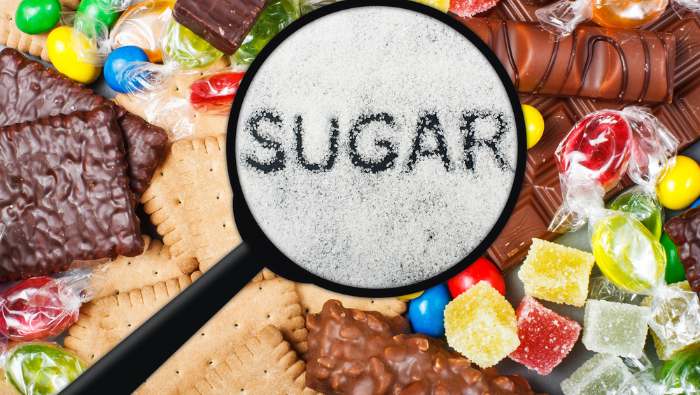Does Eating Sugar Cause Anxiety?
Eating sugary foods and drinks may be a part of our everyday diets, but could there be an underlying cause that we haven’t noticed until now?
Recent studies have suggested that eating sugar can trigger anxiety in some individuals.
The research found that unhealthy diets high in sugar can cause the body to become stressed and anxious due to the influx of glucose into the bloodstream.
A recent study from the University of Cambridge looked at how different dietary habits affected mental health.
The results showed that those who ate high amounts of sugar were more likely to suffer from depression and anxiety than those who didn’t eat so much sugar.
They also noted that this type of diet was linked with lower levels of serotonin in the brain which is known as a ‘happiness hormone’.
Can Sugar Cause Anxiety At Night?
Anxiety is a common experience for many people and can be triggered by an array of environmental and lifestyle factors.
One such factor to consider in the context of anxiety at night is sugar intake.
With its ability to stimulate but also crash our energy levels, sugar can have an effect on our overall well-being – particularly when consumed late at night.
It’s well known that too much sugar can lead to adverse health effects, including weight gain and diabetes.
But it turns out the effects of excessive sugar consumption may go further than that; some research suggests it has been linked to anxiety symptoms in both adults and children.
Additionally, consuming sugary foods late at night may interfere with sleep quality, which can then contribute to feelings of anxiety during the day as a result.
Foods That Cause Anxiety And Panic Attacks
Anxiety and panic attacks can be caused by more than just psychological factors.
Certain foods are known to have a direct effect on emotions, causing an increase in anxiety and panic attacks.
Processed snacks such as chips, cakes, cookies, and candy contain a lot of sugar which can cause mood swings due to the sudden spike in blood sugar levels.
Caffeine is another culprit that increases feelings of anxiety by stimulating the nervous system.
Alcohol consumption also has an immediate effect on the body’s chemistry which can lead to heightened feelings of fear or worry.
Finally, artificial sweeteners such as aspartame or sucralose can affect neurotransmitter levels resulting in increased stress hormones like cortisol or epinephrine which exacerbate anxious feelings.
Foods To Avoid With Anxiety
Anxiety can be an incredibly difficult emotion to manage, and it often feels like a never-ending rollercoaster of emotions.
While there are many treatments available for anxiety, dietary changes may also play an important role.
Certain foods have been shown to increase levels of anxiety and should be avoided if possible.
Certain processed foods, such as those high in sugar or trans fats, can disrupt the balance of hormones in the body which can heighten feelings of anxiety.
Caffeine is another stimulant that has been linked to increased feelings of anxiety; limiting or avoiding coffee, tea, and energy drinks may be beneficial for managing symptoms.
Particularly spicy foods can cause physical discomfort which could exacerbate feelings of stress or panic.
Foods rich in omega-3 fatty acids are usually recommended for improving mental health as they help to reduce inflammation throughout the body.
Can Eating Too Much Sugar Cause Anxiety?
Eating too much sugar can have a variety of negative consequences on our physical and mental health, including anxiety.
Anxiety is an emotion that can be caused by many factors, including poor diet.
Research suggests that excessive sugar consumption plays a role in anxiety levels.
The effects of sugar on our bodies are complex and varied, but the evidence suggests that high sugar intake can cause difficulty regulating emotions such as fear and stress.
This may lead to feelings of anxiousness or even panic attacks when confronted with challenging situations or events.
Moreover, studies have linked extreme sugar consumption to an increased risk of depression and other mood disorders due to changes in the brain’s chemistry.
The exact cause-and-effect relationship between sugar consumption and anxiety is still being studied by researchers around the world.
Why Does Eating Sugar Make Me Anxious?
Eating sugar can be a source of joy for many people, but it can also have some undesirable side effects.
One such unwanted byproduct is increased anxiety. But why does eating sugar make us feel so anxious?
The main reason that sugar has been linked to anxiety is its effect on blood glucose levels.
Foods high in sugar, carbohydrates, or both raise our blood glucose levels quickly, which triggers an alarm response in the body causing us to become anxious.
Additionally, consuming too much sugar can lead to spikes and dips in our energy levels – another factor that can make us feel anxious.
Can Eating Sugar Cause Anxiety Disorders?
Eating too much sugar has long been associated with physical ailments such as diabetes and obesity, but could it also have implications for mental health?
Recent studies suggest that consuming high quantities of sugar could indeed be linked to anxiety disorders.
A study conducted by the Harvard School of Public Health found that people who ate large amounts of sugary foods and beverages were more likely to suffer from depression and anxiety.
The researchers concluded that there was a connection between higher levels of sugar consumption and a greater risk for psychological distress.
Moreover, individuals who already had symptoms of anxiety or depression may find their condition worsened when they consumed a diet high in sugar.
Sugar stimulates the release of dopamine, which is associated with pleasurable feelings.
Can Eating Sugar Give You Anxiety?
The consumption of sugar has long been linked to health issues such as obesity and diabetes, but what about the impact it can have on mental health?
Recent research suggests that eating too much sugar can actually lead to anxiety.
A study conducted by the University of California showed that the levels of glucose in participants’ bodies directly affected their emotional state.
The findings showed that those with higher glucose levels were more likely to suffer from anxiety-like symptoms than those with lower glucose levels.
This indicates a possible correlation between blood sugar levels and feelings of anxiety.
Furthermore, frequent consumption of sugary foods has also been associated with a heightened risk for depression over time.
Eating sweet treats on a regular basis might provide an initial boost in mood, however, this could be shortlived and lead to a feeling of impending dread or doom in the near future.
Does Sugar Aggravate Anxiety?
Anxiety is a mental health disorder that affects millions of people worldwide.
While there are numerous treatment options available, some research suggests that sugar may aggravate anxiety symptoms.
This article will explore the link between sugar and anxiety to help you better manage your disorder.
The role of sugar in anxiety is complex and multi-faceted.
To begin with, eating sugary foods can cause blood sugar spikes which can lead to irritability, increased heart rate, and difficulty concentrating – all common symptoms of anxiety.
Similarly, high amounts of sugar consumption have been linked to inflammation in the body which can worsen existing anxious feelings and increase stress levels.
Can Lots Of Sugar Cause Anxiety?
Many people reach for sugary snacks and treats to give themselves a short-term energy boost or to satisfy their cravings.
Recent research has found a link between high sugar consumption and the development of anxiety disorders.
When we consume large amounts of sugar, our body’s insulin production increases rapidly.
This sudden change in blood glucose levels can trigger a “fight or flight” response in the body, which heightens alertness and causes feelings of stress and panic.
Additionally, eating too much processed foods with added sugars can lead to an imbalance in essential nutrients like magnesium, zinc, and B vitamins – all of which are key components for healthy brain functioning.
Can Sugar Make You Have Anxiety?
Can sugar make you have anxiety? This is a commonly asked question, and the answer is not so straightforward.
Studies show that high-sugar diets can affect our mental health and that some people may be particularly sensitive to the effects of sugar on their emotions.
Scientists are exploring how eating too much sugar could lead to changes in our bodies that are linked to stress, depression, and anxiety.
The biological link between dietary intake of glucose or fructose and mental health symptoms has been studied for over a decade.
Research suggests that consuming large amounts of added sugars can increase levels of cortisol, the hormone associated with stress.
High levels of cortisol can then lead to an increased risk for depression and anxiety disorders.
Eating sugary foods also leads to a quick rise in blood glucose levels which can cause mood swings and irritability – two common symptoms associated with anxiety disorders.
Can Eating Sweets Cause Anxiety?
Sweets can be satisfying and enjoyable as a treat, but did you know that eating too many could have an impact on your mental health?
Anxiety is a common mental health problem, with rates increasing in recent years.
Recent research has suggested that overindulging in sugary treats can lead to feelings of anxiety and depression.
A study published in the journal Nutrients found that people who ate more sugar experienced increased levels of stress and anxiety.
Participants reported having higher levels of cortisol, the primary hormone related to stress, after consuming sweets.
This suggests that eating too much sugary food can cause a person’s body to become overwhelmed by the amount of sugar it needs to process.
In terms of prevention, reducing or eliminating added sugars from your diet is key to better emotional well-being, according to experts.
Quitting Sugar Cured My Depression
Cutting out sugar is a difficult but worthwhile endeavor for anyone that is looking to improve their overall physical and mental health.
For one person in particular, it was the key to relieving their depression.
After struggling with his mental illness for years on end without any relief or tangible improvements, he decided to take matters into his own hands by drastically changing his diet and completely cutting out sugar from his regime.
After just two weeks of abstaining from sugar altogether, he noticed a drastic change in how he was feeling mentally and emotionally; the depression that had plagued him for years began to dissipate and life suddenly seemed brighter than it had in a long time.
Should I Avoid Sugar If I Have Anxiety?
When it comes to managing anxiety, diet plays an important role.
Many people wonder if avoiding sugar can help them cope with their anxious feelings.
Knowing the effects of sugar on your mental health can help you make a decision about whether or not you should cut down on this food group.
Sugar has been linked to many adverse physical and mental health outcomes, including increased stress levels and mood swings.
Studies have found that high sugar intake was associated with higher levels of cortisol – a hormone released in response to stressful events – as well as more frequent psychological distress and depressive symptoms.
Furthermore, eating too much sugar can lead to blood glucose fluctuations which may worsen feelings of anxiety and irritability.
Therefore, reducing your daily intake of sugary foods such as cakes, cookies, candy or soda can be beneficial for those looking to manage their anxiety levels effectively.
You may also enjoy…
Do You Have an External or Internal Locus of Control?








